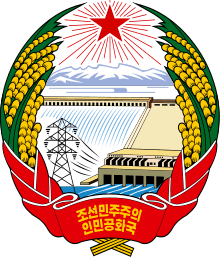Strong and Prosperous Nation
 |
|---|
| This article is part of a series on the politics and government of North Korea |
|
|
|
Related topics |
Strong and Prosperous Nation (Chosŏn'gŭl: 강성대국; Hancha: 强盛大國; RR: gangseongdaeguk; MR: kangsŏngtaeguk; lit. "powerful and great country") is a policy initiated by North Korean leader Kim Jong-il. The term first appeared in North Korean media in August 1998 in reference to Kim Jong-il having provided "on-the-spot guidance" in Chagang Province in February 1998.[1] In an effort to build a “strong and prosperous” nation, North Korea focuses on four areas: ideology, politics, the military, and the economy.[2] Kim Jong-il's son and successor Kim Jong-un declared 2012, the centennial of the birth of Kim Il-sung, as the year of Strong and Prosperous Nation.[3]
According to Victor Cha, the policy has been "an utter failure in terms of the state's performance, with the one exception of building nuclear weapons".[4]
See also
References
Works cited
- Cha, Victor (2012). The Impossible State: North Korea, Past and Future. London: Random House. ISBN 978-1-4481-3958-3.